Premium Digestive Enzymes Supplements: Market Leaders
The following table presents a curated selection of exceptionally high-quality, premium Digestive Enzymes Supplements available on the market today. These products represent the upper echelon of digestive health solutions, featuring proprietary blends of clinically-researched ingredients, pharmaceutical-grade manufacturing standards, and comprehensive formulations designed for optimal absorption and efficacy. While these premium Digestive Enzymes Supplements come with higher price points than typical mass-market options, they deliver superior quality, potency, and targeted therapeutic benefits for those seeking the absolute best in digestive health support.
| Rank | Product Name | Key Ingredients | Best For | Price | Buying Link |
|---|---|---|---|---|---|
| 1 | DigestSync | Prebiotics, Digestive Enzymes, Ginger Extract | Bloating Relief | $38-$69 per bottle | Official Website |
| 2 | Finessa | Probiotics, Digestive Enzymes, L-Glutamine | Digestive Comfort | $39.99-$59.99 per bottle | Official Website |
| 3 | VivoGutPro | Probiotic Blend, Digestive Enzymes, Aloe Vera | Digestive Regularity | $49.95-$79.95 per bottle | Official Website |
| 4 | DigestiStart | Probiotics, Prebiotics, Digestive Enzymes | Overall Gut Health | $49-$79 per bottle | Official Website |
| 5 | GutVita | Probiotics, Fiber Blend, Slippery Elm | Gut Lining Support | $44.95-$69.95 per bottle | Official Website |
| 6 | GutOptim | Probiotics, Turmeric, Marshmallow Root | Inflammation Relief | $45-$65 per bottle | Official Website |
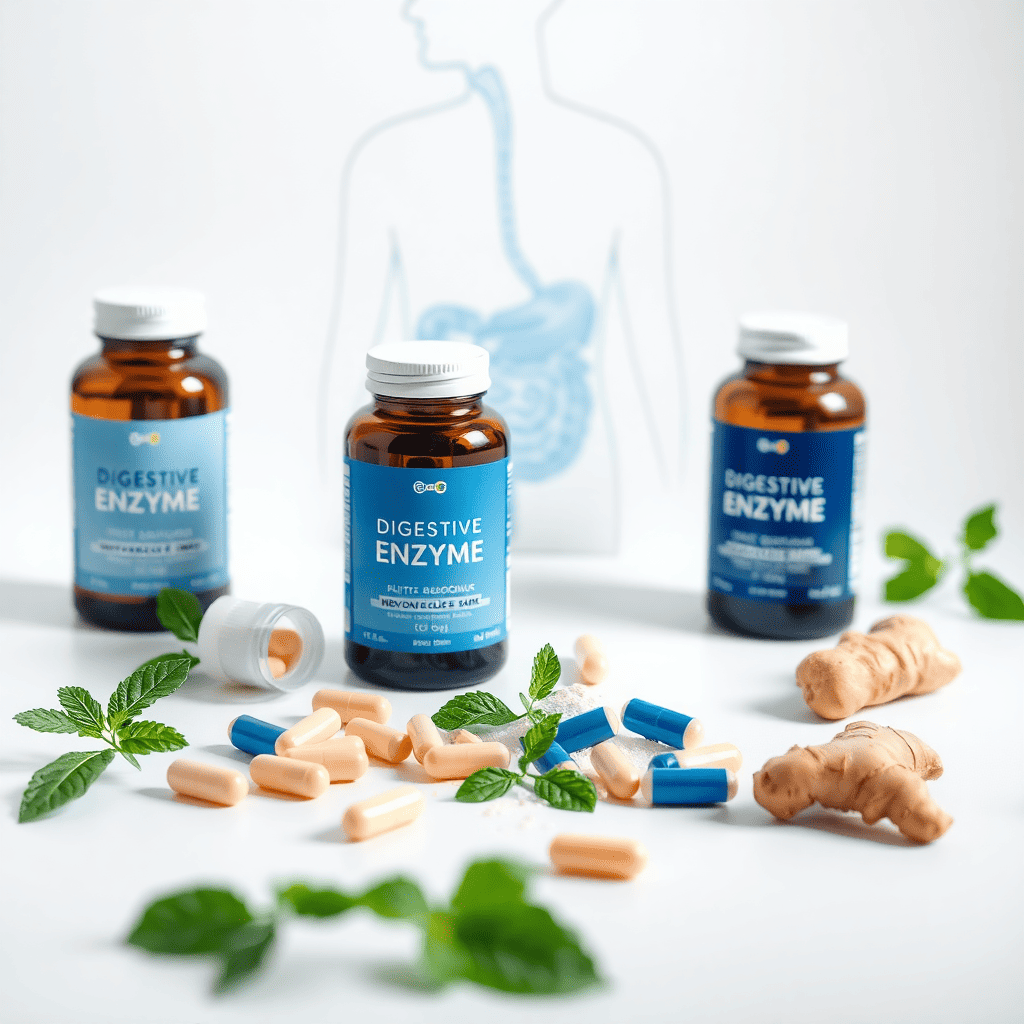
Introduction: Why Digestive Enzymes Supplements Matter 🔍
Do uncomfortable bloating and slow digestion plague your after-meal experience? You’re not alone. Millions struggle with digestive discomfort, and high-quality Digestive Enzymes Supplements offer an effective, science-backed solution.
These specialized proteins break down food into absorbable nutrients, reducing digestive discomfort and maximizing nutrient absorption. Think of Digestive Enzymes Supplements as your digestive system’s personal assistants, especially valuable if you face chronic digestive challenges or occasional discomfort after meals.
According to the Mayo Clinic, proper digestion is essential for overall health, as it ensures your body can access the nutrients it needs from food. Quality Digestive Enzymes Supplements can help bridge the gap when your natural enzyme production falls short. 💡
Understanding Digestive Enzymes: Your Body’s Food Processors 🧬
What Are Digestive Enzymes?
Digestive enzymes act as microscopic scissors, cutting large food molecules into smaller, usable pieces. Without adequate enzymes, even the healthiest diet can leave you nutritionally deprived.
Your body produces digestive enzymes in several key locations:
- Pancreas: Creates most digestive enzymes
- Stomach: Releases pepsin to break down proteins
- Small intestine: Produces enzymes to complete digestion
- Salivary glands: Generate amylase to start carbohydrate breakdown
Research from Cleveland Clinic shows that factors like aging, stress, health conditions, and dietary habits can decrease your natural enzyme production, resulting in digestive issues and poor nutrient absorption. This is where supplemental digestive enzymes become valuable for many people. 📊
Types of Digestive Enzymes: Specialized Tools for Different Foods 🥑🍞🥩
Different enzymes target specific food components:
- Amylase: Transforms carbohydrates and starches into simple sugars
- Protease: Converts proteins into amino acids essential for muscle repair and immune function
- Lipase: Processes fats into fatty acids and glycerol
- Lactase: Breaks down lactose (milk sugar) for those with lactose intolerance
- Cellulase: Helps digest plant fiber, not naturally produced by humans
- Alpha-galactosidase: Breaks down complex sugars in beans and vegetables that cause gas
A PubMed study suggests that Digestive Enzymes Supplements can help compensate for reduced natural enzyme production and improve digestive function for people of all ages. 🔬
How Digestive Enzymes Supplements Work: A Synchronized Process ⚙️
Digestion begins before your first bite. When you smell or see food, your body releases saliva containing amylase. As you chew, this enzyme starts breaking down starches.
In your stomach, pepsin (a protease) tackles proteins in a highly acidic environment. The partially digested food then moves to your small intestine, where pancreatic enzymes continue the breakdown process.
MedlinePlus explains that Digestive Enzymes Supplements enhance this natural process by providing additional enzymes that break down food more efficiently. Taking them before meals ensures they’re active when food reaches your digestive tract. 🕒
For those with insufficient enzyme production, these supplements can dramatically improve digestion and nutrient absorption, reducing bloating, gas, and indigestion.
Benefits of Digestive Enzymes Supplements: Beyond Comfort ✨
Improved Nutrient Absorption 🥗
Digestive Enzymes Supplements enhance nutrient bioavailability by properly breaking down food. This improved absorption affects your overall health—users often report increased energy, better skin health, and improved mood.
Research supports this benefit, particularly for those with specific enzyme deficiencies. A study in the Journal of Clinical Gastroenterology showed that lipase supplementation significantly improves fat absorption in people with pancreatic insufficiency.
Reduced Digestive Discomfort 😌
Bloating, gas, and indigestion often result from undigested food fermenting in your gut. Enzyme supplements reduce this fermentation by breaking down food more completely, especially after consuming problematic foods like beans, cruciferous vegetables, or dairy.
Sarah, a 42-year-old teacher, shares: “I’ve always had trouble with bloating after meals, especially when eating out. Since starting a Digestive Enzymes Supplement, I can enjoy restaurant meals without worrying about looking six months pregnant afterward!”
Support for Specific Digestive Conditions 🏥
Digestive Enzymes Supplements particularly benefit people with certain health conditions:
- Lactose Intolerance: Lactase supplements help digest dairy products comfortably
- IBS Symptoms: Certain enzyme combinations may reduce bloating and gas associated with Irritable Bowel Syndrome
- Age-related Enzyme Decline: Supplements compensate for the natural decrease in enzyme production as we age
- Recovery from Digestive Surgeries: Supports altered digestive systems after gallbladder removal or gastric surgeries
- Pancreatic Insufficiency: Medical-grade pancreatic enzymes help conditions like chronic pancreatitis and cystic fibrosis
Hartford HealthCare notes that proper enzyme supplementation can significantly improve quality of life for those with digestive disorders. 💪
Top 6 Digestive Enzyme Supplements: Detailed Product Reviews
1. DigestSync
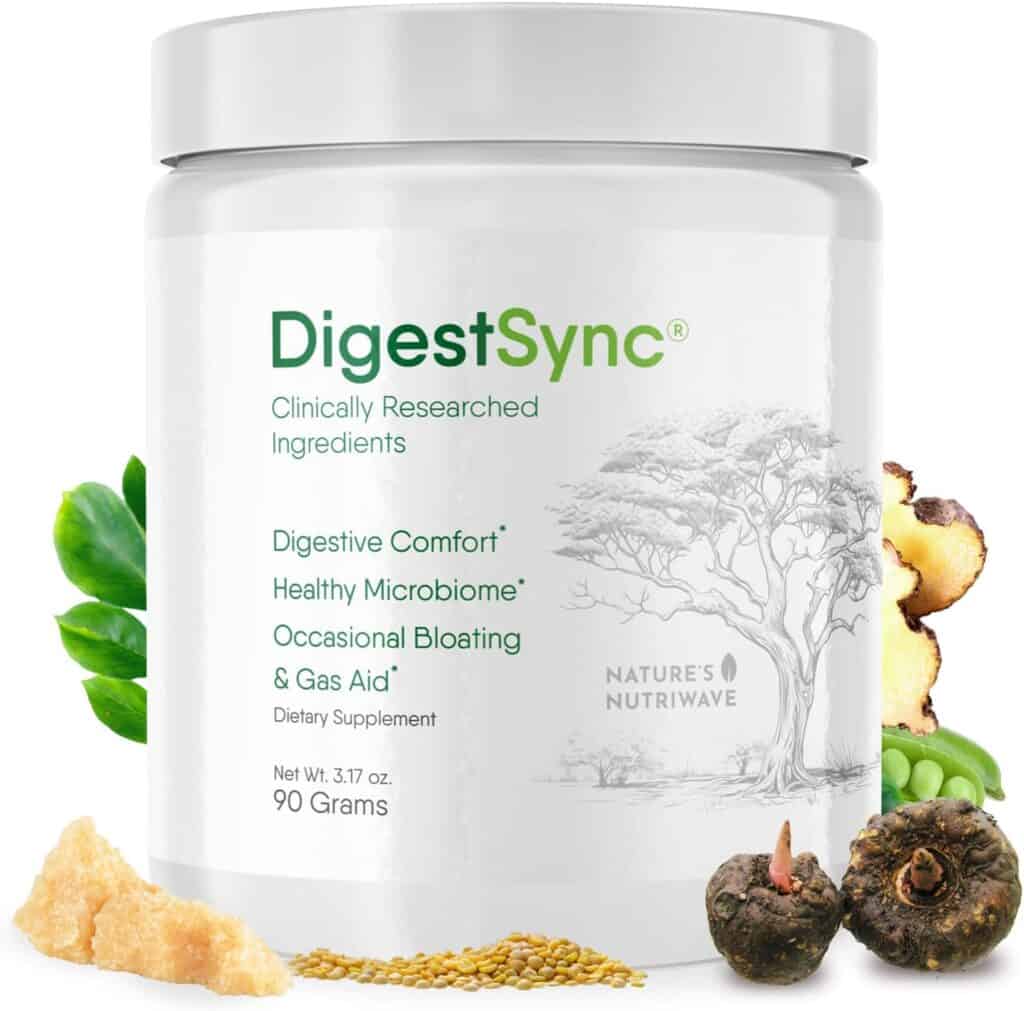
Overall Rating: ★★★★★ (5/5)
DigestSync stands out as our top recommendation for digestive enzyme supplements in 2025, particularly for those suffering from bloating and general digestive discomfort.
Product Overview
DigestSync combines a comprehensive blend of digestive enzymes with prebiotics and ginger extract, creating a powerful formula specifically designed to target bloating while supporting overall digestive health. The proprietary enzyme blend includes all essential digestive enzymes (amylase, protease, lipase) plus specialized enzymes like lactase, alpha-galactosidase, and cellulase to address specific food intolerances.
Key Ingredients
- Full-spectrum digestive enzymes: Breaks down proteins, fats, carbohydrates, dairy, and fiber
- Prebiotic fiber blend: Nourishes beneficial gut bacteria
- Ginger extract: Reduces inflammation and soothes the digestive tract
- Peppermint oil: Relieves intestinal discomfort and cramping
Pros
- Rapid relief from bloating, usually within 30 minutes of consumption
- Delayed-release capsules ensure enzymes reach the intestines intact
- Third-party tested for potency and purity
- Free from major allergens (gluten, dairy, soy)
- Suitable for vegetarians
Cons
- Premium pricing ($38-$69 per bottle)
- Limited availability (only through official website)
User Experience
Users consistently report significant reductions in post-meal bloating and discomfort. Many reviewers mention that DigestSync works quickly and effectively, even after consuming problematic foods like beans, dairy, or high-fat meals. The inclusion of ginger provides additional soothing benefits that users appreciate.
Value Assessment
While priced at the higher end of the market ($38-$69 per bottle), DigestSync offers superior quality and effectiveness that justifies the investment. The company offers substantial discounts on multi-bottle purchases, improving the overall value.
Recommendation
DigestSync is ideal for individuals who primarily struggle with bloating and gas after meals. Its comprehensive enzyme blend and additional soothing ingredients make it our top recommendation for overall digestive comfort.
2. Finessa
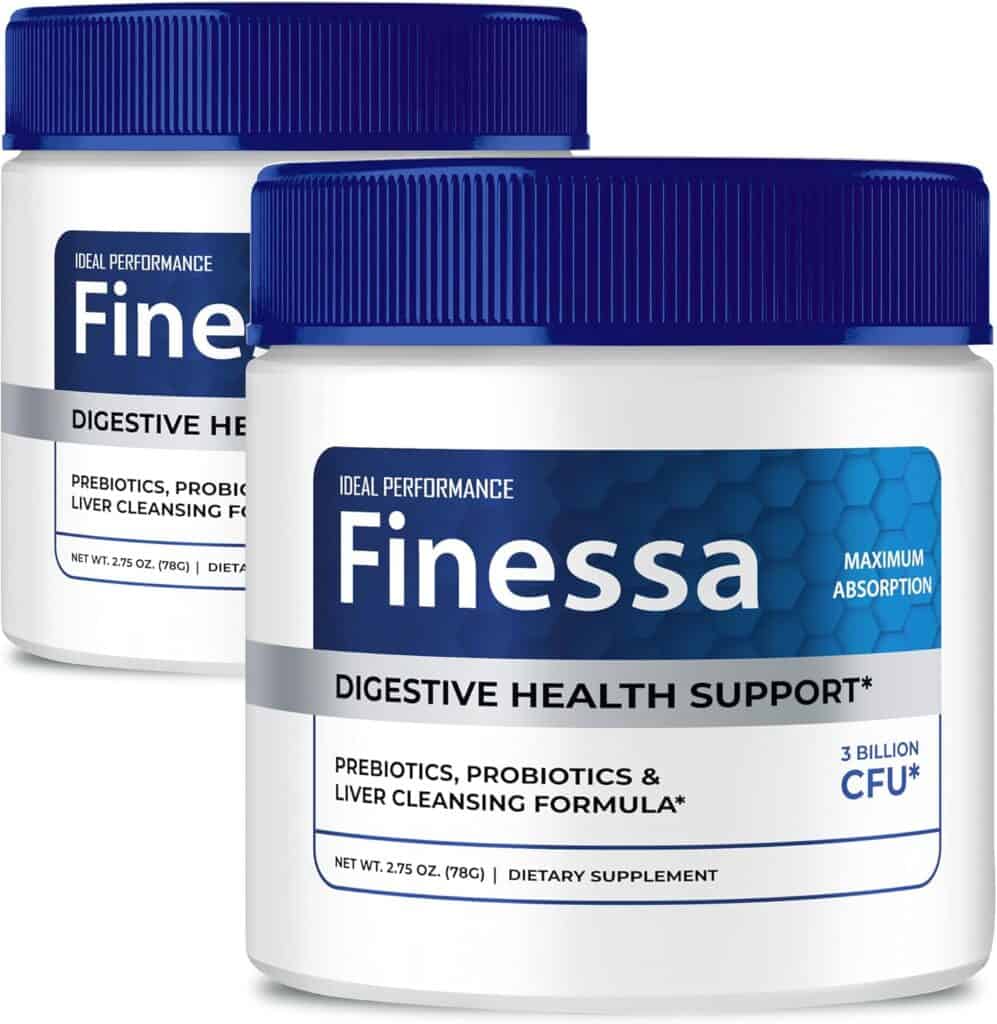
Overall Rating: ★★★★½ (4.5/5)
Finessa takes a comprehensive approach to digestive health, combining digestive enzymes with probiotics and gut-healing nutrients.
Product Overview
Finessa offers a science-backed formulation designed to provide complete digestive support. Beyond just enzymes, this product incorporates clinically-studied probiotics and L-glutamine to promote gut lining integrity and overall digestive comfort.
Key Ingredients
- Broad-spectrum digestive enzymes: Aids in breaking down all food groups
- Multi-strain probiotic blend (15 billion CFU): Balances gut flora
- L-Glutamine: Supports intestinal cell regeneration and gut lining integrity
- Marshmallow root: Soothes irritated digestive tissues
Pros
- Comprehensive formula addresses multiple aspects of digestive health
- Shelf-stable probiotics require no refrigeration
- Enteric-coated capsules protect sensitive ingredients from stomach acid
- Manufactured in GMP-certified, FDA-registered facility
- 90-day money-back guarantee
Cons
- Requires consistent use for optimal results (may take 2-3 weeks to see full benefits)
- Two-capsule serving size may be inconvenient for some
- Contains trace amounts of milk proteins (from probiotic cultivation)
User Experience
Customers praise Finessa for its ability to provide long-term digestive relief beyond just meal-time comfort. Many users report improvements in overall gut health markers like regularity, reduced digestive discomfort, and better nutrient absorption. The inclusion of probiotics and L-glutamine appears to provide additional benefits for those with sensitive digestive systems.
Value Assessment
Priced between $39.99-$59.99 per bottle, Finessa offers good value considering its comprehensive formulation. The 90-day guarantee minimizes purchase risk, and subscription options can reduce the per-bottle cost significantly.
Recommendation
Finessa is ideal for those seeking a multi-faceted approach to digestive health that goes beyond basic enzyme supplementation. It’s particularly suitable for individuals with sensitive digestion or those recovering from digestive issues.
3. VivoGutPro
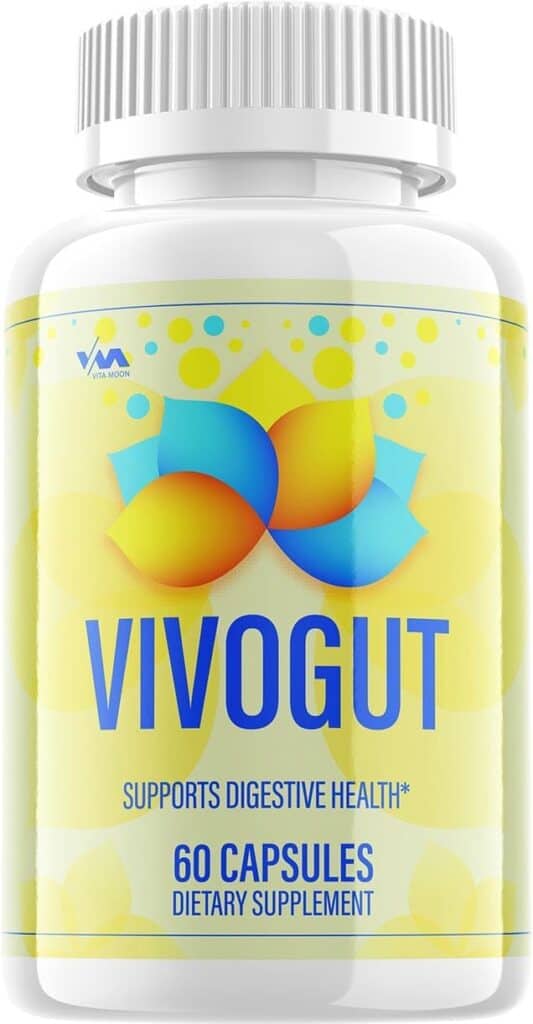
Overall Rating: ★★★★½ (4.5/5)
VivoGutPro specializes in supporting digestive regularity while providing comprehensive enzyme support.
Product Overview
VivoGutPro combines digestive enzymes with a robust probiotic formulation and soothing aloe vera to create a product specifically designed to promote regular, comfortable bowel movements while optimizing nutrient absorption.
Key Ingredients
- Complete digestive enzyme complex: Supports breakdown of all major food groups
- Probiotic blend (20 billion CFU): Features 8 clinically-studied strains
- Aloe vera extract: Soothes the digestive tract and supports regular elimination
- Triphala: Traditional herb blend that gently supports elimination
Pros
- Effectively addresses constipation and irregularity
- Provides rapid relief from digestive discomfort
- High-potency probiotic strains survive stomach acid
- Free from artificial ingredients and common allergens
- Sustainably sourced ingredients
Cons
- Higher price point ($49.95-$79.95 per bottle)
- May cause temporary increased bowel activity during initial use
- Larger capsule size may be difficult for some to swallow
User Experience
Users consistently mention VivoGutPro’s effectiveness in establishing healthy digestive regularity without causing dependency. Many reviewers with chronic constipation note significant improvements within the first week of use. The combination of enzymes and probiotics appears to create synergistic benefits for overall digestive function.
Value Assessment
While priced at the premium end of the market ($49.95-$79.95 per bottle), VivoGutPro’s specialized formulation delivers value for those specifically struggling with irregularity alongside digestive enzyme needs. The company offers bundle pricing that improves the overall value proposition.
Recommendation
VivoGutPro is particularly well-suited for individuals who struggle with constipation or irregular bowel movements in addition to general digestive issues. Its gentle yet effective approach makes it appropriate for long-term use.
4. DigestiStart
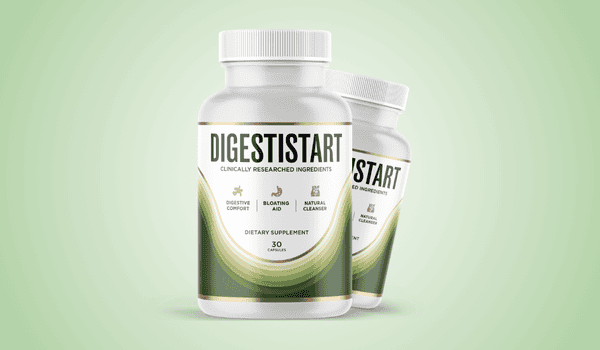
Overall Rating: ★★★★ (4/5)
DigestiStart offers a balanced approach to gut health with its triple-action formula of probiotics, prebiotics, and digestive enzymes.
Product Overview
DigestiStart takes a holistic approach to digestive wellness by combining digestive enzymes with both prebiotics and probiotics. This comprehensive formula supports the entire digestive process while promoting a healthy gut microbiome.
Key Ingredients
- Full-spectrum enzyme blend: Contains all essential digestive enzymes
- Prebiotic fiber complex: Includes FOS, inulin, and resistant starch
- Probiotic blend (10 billion CFU): Features 6 well-researched strains
- Zinc carnosine: Supports gut lining integrity
Pros
- Addresses multiple aspects of digestive health
- Delayed-release capsule technology ensures ingredient delivery to the intestines
- Free from major allergens and artificial ingredients
- Contains zinc carnosine for additional gut lining support
- Suitable for daily maintenance
Cons
- Moderate enzyme potency compared to specialized formulas
- Requires consistent daily use for best results
- Premium pricing ($49-$79 per bottle)
User Experience
Users report gradual but significant improvements in overall digestive health, including better regularity, reduced bloating, and improved comfort after meals. Many reviewers appreciate the comprehensive approach, noting benefits beyond just improved digestion, such as clearer skin and increased energy levels, suggesting improved nutrient absorption.
Value Assessment
With pricing between $49-$79 per bottle, DigestiStart falls in the premium category, but its comprehensive formulation provides value for those seeking an all-in-one digestive health solution. Subscription options can reduce the ongoing cost.
Recommendation
DigestiStart is an excellent choice for those seeking overall gut health improvement rather than targeting a specific digestive issue. It’s particularly well-suited for individuals looking for a single supplement to support their complete digestive wellness.
5. GutVita
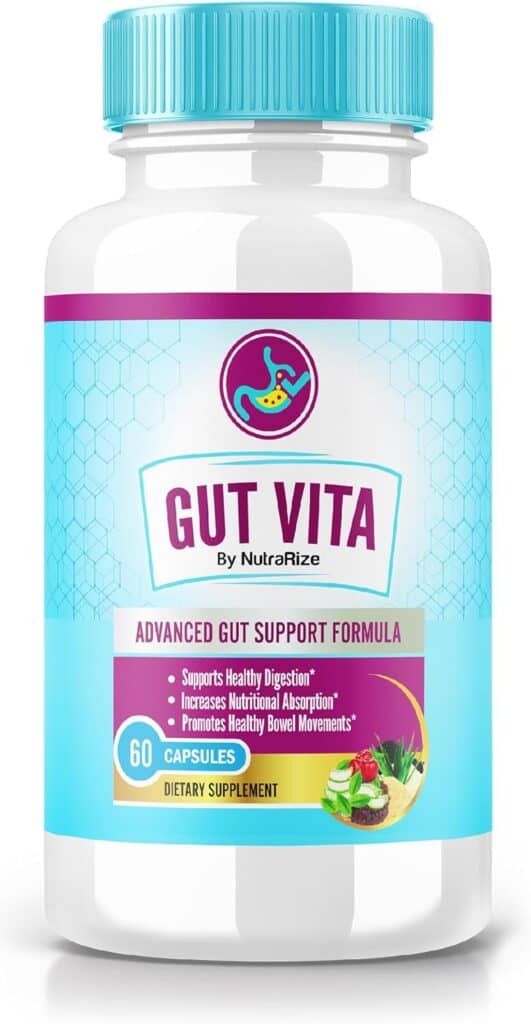
Overall Rating: ★★★★ (4/5)
GutVita specializes in supporting and repairing the gut lining while providing essential digestive enzymes.
Product Overview
GutVita combines digestive enzymes with specialized ingredients designed to nourish and support the intestinal lining. This formula is particularly valuable for those with sensitive digestion or recovering from gut health challenges.
Key Ingredients
- Digestive enzyme blend: Provides essential digestive support
- Probiotic complex (8 billion CFU): Focuses on gut-lining supportive strains
- Fiber blend: Includes soluble fibers that soothe the digestive tract
- Slippery elm bark: Traditional herb that coats and protects the gut lining
- L-Glutamine: Amino acid that fuels intestinal cell regeneration
Pros
- Specifically formulated to support gut lining integrity
- Gentle formula suitable for sensitive systems
- Free from common irritants and allergens
- Includes both quick-relief and long-term support ingredients
- Third-party tested for purity
Cons
- Lower enzyme potency than pure enzyme formulas
- May take 2-4 weeks for full benefits
- Requires consistent use for maintenance
- Premium pricing ($44.95-$69.95 per bottle)
User Experience
Users with sensitive digestion report significant improvements in comfort and tolerance to various foods. Many reviewers mention reduced sensitivity to previously problematic foods and an overall sense of “calm digestion.” The product appears particularly effective for those recovering from digestive issues or those with ongoing gut sensitivity.
Value Assessment
Priced between $44.95-$69.95 per bottle, GutVita represents a worthwhile investment for those specifically needing gut lining support. While expensive compared to basic enzyme supplements, its specialized formulation justifies the premium for the target audience.
Recommendation
GutVita is ideal for individuals with sensitive digestion, those recovering from gut health issues, or anyone specifically concerned with maintaining gut lining integrity. It offers a gentler approach than some more potent enzyme formulas.
6. GutOptim
Overall Rating: ★★★★ (4/5)
GutOptim targets digestive inflammation while providing essential enzyme support.
Product Overview
GutOptim combines digestive enzymes with powerful anti-inflammatory ingredients to create a formula specifically designed for those experiencing inflammation-related digestive discomfort. This specialized approach helps calm an irritated digestive system while supporting proper digestion.
Key Ingredients
- Comprehensive enzyme blend: Supports complete food breakdown
- Probiotic strains (5 billion CFU): Selected for anti-inflammatory properties
- Turmeric extract (standardized to 95% curcuminoids): Powerful natural anti-inflammatory
- Marshmallow root: Soothes and coats irritated digestive tissues
- Boswellia serrata extract: Reduces inflammatory response in the gut
Pros
- Effectively targets inflammation-related digestive issues
- Enhanced curcumin absorption through black pepper extract
- Free from common allergens and irritants
- Enteric-coated capsules protect sensitive ingredients
- Money-back satisfaction guarantee
Cons
- May interact with certain medications (particularly blood thinners)
- Turmeric may cause mild stomach upset in some individuals
- Yellow turmeric may stain if capsule breaks
- Premium pricing ($45-$65 per bottle)
User Experience
Users report significant relief from inflammatory digestive symptoms, including reduced discomfort, less burning sensation, and improved overall digestive function. Many reviewers mention noticing a calming effect on their digestion within the first week of use. The anti-inflammatory benefits appear to extend beyond digestion, with some users noting improvements in joint comfort as well.
Value Assessment
Priced between $45-$65 per bottle, GutOptim offers specialized value for those dealing with inflammation-related digestive issues. While not the most affordable option, its targeted formula delivers specific benefits that justify the premium for those needing this specialized approach.
Recommendation
GutOptim is best suited for individuals experiencing inflammation-related digestive discomfort, including burning sensations, excessive sensitivity to foods, or digestive discomfort related to inflammatory conditions. It’s an excellent choice for those who haven’t found relief with standard enzyme formulas.
How to Choose the Right Digestive Enzymes Supplement: Your Buying Guide 🛒
Key Ingredients to Look For 🔎
Comprehensive Enzyme Blends vs. Specialized Formulas
For general digestive support, choose products containing at least the three core enzymes: amylase, protease, and lipase.
If you have specific food sensitivities, consider specialized formulas:
- Lactose intolerance: Choose supplements with lactase
- Bean/legume sensitivity: Look for alpha-galactosidase
- High-fiber diet: Seek cellulase
- Gluten sensitivity: Consider DPP-IV enzyme (not a treatment for celiac disease)
WebMD suggests matching enzyme supplements to your specific digestive needs for best results. 📝
Additional Supportive Ingredients
Many top Digestive Enzymes Supplements include complementary ingredients:
- Probiotics: Work synergistically with enzymes to improve digestion and gut health
- Herbs: Ginger, peppermint, and fennel support digestion and may enhance enzyme activity
- Betaine HCl: Supports stomach acid production necessary for proper enzyme function
- Ox Bile: Helps with fat digestion, especially helpful for those without a gallbladder
Clean Formulation Considerations 🌱
The best Digestive Enzymes Supplements contain diverse enzymes without unnecessary additives:
- Check for common allergens like gluten, dairy, soy, and corn
- Look for non-GMO and organic certifications if important to you
- Avoid artificial colors, flavors, and preservatives
- Consider vegetarian/vegan options if you avoid animal products
Potency and Activity Units: Understanding the Numbers 🔢
Enzymes are measured by activity, not weight. Different enzymes use different units:
- Amylase: DU (Dextrinizing Units) or SKB (Sandstedt-Kneen-Blish Units)
- Protease: HUT (Hemoglobin Units in Tyrosine) or SAP (Spectrophotometric Acid Protease Units)
- Lipase: FIP (Fédération Internationale Pharmaceutique) or LU (Lipase Units)
- Lactase: ALU (Acid Lactase Units) or LacU (Lactase Units)
These measurements indicate how much food the enzyme can break down. Higher numbers generally mean more potent enzymes.
According to Drugs.com, understanding enzyme potency is crucial for selecting effective supplements. 🧮
Effective Dosages
For general digestive support, look for:
- 10,000-20,000 DU of amylase
- 50,000-100,000 HUT of protease
- 1,000-3,000 FIP of lipase per serving
For specific food intolerances, higher amounts of the relevant enzyme may help (e.g., 4,500-9,000 ALU of lactase for lactose intolerance).
Start with the recommended dosage and adjust based on your response.
Quality Indicators and Certifications 🏅
When evaluating top Digestive Enzymes Supplements, look for:
- GMP Certification: Ensures production in facilities following strict quality control standards
- Third-party Testing: Verifies label claims and checks for contaminants
- Allergen-free Manufacturing: Prevents cross-contamination with common allergens
- Vegetarian/Vegan Considerations: Plant-based or fungal-derived enzymes for those avoiding animal products
Proper Dosage and Timing: Maximizing Effectiveness ⏱️
General Dosage Guidelines
Follow manufacturer-recommended dosages as a starting point, but adjust based on your needs:
- General digestive support: 1-2 capsules per meal
- Larger or problematic meals: 2-3 capsules
- Maintenance: 1 capsule with your largest daily meal
Adjust based on meal size and content:
- Larger meals typically require more enzymes
- High-fat, protein, or complex carbohydrate meals may need additional enzymes
- Simple meals may require fewer enzymes or none at all
Start with lower doses than recommended and gradually increase as needed to minimize adjustment symptoms and find your optimal dosage.
When to Take Digestive Enzymes ⌚
Timing significantly impacts effectiveness:
- Before Meals (5-15 minutes): Allows enzymes to be ready when food arrives in the stomach and small intestine—most effective approach
- During Meals: Taking enzymes with your first few bites is also effective and often more convenient
- After Meals: Within 30 minutes after eating can still provide some benefit if you forgot earlier
For best results, establish a consistent routine that fits your lifestyle.
Cleveland Clinic recommends taking enzymes just before or at the beginning of meals for optimal effectiveness. 🍽️
Potential Side Effects: What to Watch For ⚠️
Digestive Enzymes Supplements are generally safe, but be aware of possible side effects:
Common Mild Side Effects
- Mild nausea or stomach upset
- Diarrhea or changes in bowel movements
- Headache
- Gas or bloating (usually temporary during adjustment)
These effects are typically mild and often resolve as your body adjusts. Starting with a lower dose can minimize these effects.
When to Consult a Healthcare Provider 👨⚕️👩⚕️
- If you experience severe or persistent digestive symptoms
- If you have a diagnosed digestive condition like pancreatitis, gallbladder disease, or ulcers
- If you’re taking medications that might interact with digestive enzymes
- If you’re pregnant or breastfeeding
Contraindications and Precautions
- Some enzyme supplements contain animal-derived ingredients—check if you’re vegetarian or vegan
- Those with allergies to pork, pineapple, or papaya should check ingredient lists carefully
- People with hemophilia or those on blood thinners should consult their doctor before taking bromelain or papain
According to a 2016 review in the journal Nutrients, Digestive Enzymes Supplements are generally well-tolerated, but individual responses vary. 🔍
Who Should Consider Digestive Enzymes Supplements: Is It Right for You? 🤔
Common Digestive Issues That May Benefit
If you regularly experience these symptoms after eating, Digestive Enzymes Supplements might help:
- Bloating and gas, especially after specific foods
- Feeling uncomfortably full after normal-sized meals
- Undigested food in stool
- Floating stools (can indicate fat malabsorption)
- Heartburn or indigestion
- Meal-related constipation or diarrhea
Self-Assessment Quiz: Do You Need Digestive Enzymes? ✅
Answer yes or no to these questions:
- Do you often feel bloated after meals?
- Do certain foods (like dairy, beans, or fatty foods) consistently cause digestive discomfort?
- Do you feel tired after eating, even after a good night’s sleep?
- Have you noticed undigested food in your stool?
- Are you over 50 years old?
- Have you had your gallbladder removed?
- Do you have a diagnosed digestive condition like IBS?
- Do you take antacids regularly?
If you answered yes to three or more questions, you might benefit from Digestive Enzymes Supplements. Consider discussing this with your healthcare provider.
Age-Related Enzyme Deficiency 👵👴
Natural digestive enzyme production decreases with age, typically beginning around age 30 and becoming more noticeable after 50.
Signs of reduced enzyme activity in older adults include:
- Increased gas and bloating after meals
- Developing new food sensitivities
- Feeling fuller longer after eating
- Decreased enjoyment of food
- Nutrient deficiencies despite a healthy diet
MedlinePlus confirms that digestive function naturally changes with age, potentially necessitating supplementation. 🕰️
Conclusion: Finding Your Digestive Solution 🎯
Digestive Enzymes Supplements offer a practical solution for many digestive challenges. By understanding how they work, which ones match your specific needs, and how to use them effectively, you can experience significant improvements in digestive comfort and nutrient absorption.
Remember that individual responses vary, and finding the right supplement may require some experimentation. Start with the recommendations in this guide, pay attention to your body’s response, and adjust as needed.
With the right Digestive Enzymes Supplement, you can say goodbye to uncomfortable bloating and digestive distress—and hello to more enjoyable, comfortable meals! 🎉
